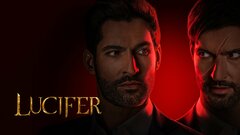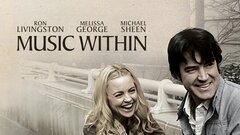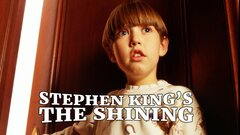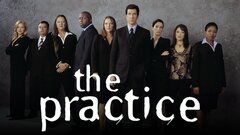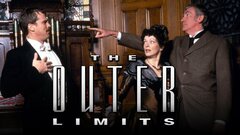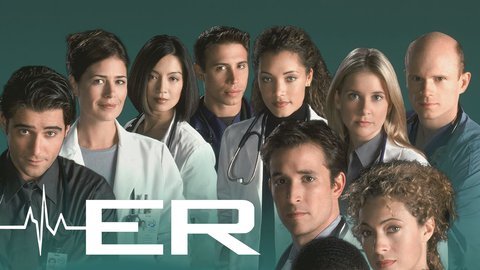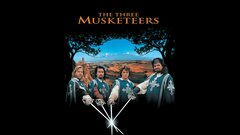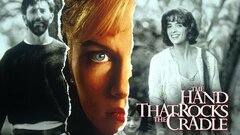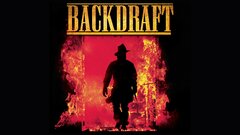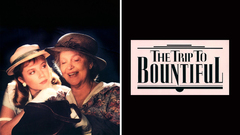Though Rebecca DeMornay's place in pop culture history was assured by two extreme roles - the glacially gorgeous prostitute in "Risky Business" (1983) and a devious psychopath in "The Hand That Rocks the Cradle" (1992) - the California native took great pains to prove that her talents laid beyond roles that were based solely around her icy blonde beauty.
Over the course of her 20-plus-year career, DeMornay proved that she could handle characters of all stripes, from the scheming Lady De Winter in "The Three Musketeers" (1993), to terrorized Wendy Torrance in the TV remake of "The Shining" (1997) to the insecure mother of a trouble skateboarding champ in "Lords of Dogtown" (2005). Along the way, the enterprising actress also dabbled in producing and directing to keep herself in the game and improve upon her own projects throughout the years.
Born Rebecca Pearch in Santa Rosa, CA on Aug. 29, 1959 - though other sources cite 1961 or 1962 as her year of birth - DeMornay's birth father was George Walter Pearch, better known among late-night television fans as the absurd, ultra-conservative talk show host, Wally George. Her parents divorced when DeMornay was two; she adopted her stepfather Richard DeMornay's surname shortly thereafter. DeMornay and her father, Wally George, had a lengthy and tempestuous relationship, with the two estranged for some 15 years prior to his death in 2003.
Richard DeMornay died when she was five, leaving her mother to relocate her daughter and stepson to Europe, where they traveled extensively. DeMornay graduated with high honors from an exclusive private school in Germany, and apparently dabbled in songwriting while still a teenager - there were unconfirmed reports that she penned a song for a Hong Kong exploitation film titled "Goodbye Bruce Lee" (1975).
DeMornay returned to the United States in 1980 and studied acting at the prestigious Lee Strasberg Institute. She relocated to California to work as an apprentice at Francis Ford Coppola's Zoetrope Studios and made her onscreen debut in a bit part in Coppola's big-budget "One from the Heart" (1982). Shortly thereafter, she rose to fame as Lana, the business-minded call girl who captures Tom Cruise's affections in "Risky Business" (1983). The film was a substantial hit and her subway seduction of Cruise helped make DeMornay a crush object for countless male moviegoers. The two actors carried on their relationship off-screen for the next two years, even sharing a home during this period.
The much discussed Cruise relationship would not be her last through the years. DeMornay's personal life often earned her as much press as her movies. In addition to the toothy future megastar, she was also linked to the acclaimed songwriter Leonard Cohen for many years, serving as co-producer and arranger on his critically lauded album, "The Future" (1992). She also raised eyebrows by dating her "Never Talk to Strangers" co-star Harry Dean Stanton, who exceeded her age by several decades. DeMornay was also married for a year to writer and director Bruce Wagner before marrying sportscaster Patrick O'Neil - the son of actor Ryan O'Neil - with whom she would have two daughters.
In a move that would foreshadow many of DeMornay's career choices in later years, she followed this star-making role with a smaller one in the devastating independent drama "Testament" (1983) - co-starring with a then-unknown Kevin Costner as a young couple caught in the aftermath of a nuclear missile attack. DeMornay then returned to Hollywood movies with "The Slugger's Wife" (1985), a comedy that, despite a script by Neil Simon and direction by Hal Ashby, was met with universal disdain by critics and audiences alike. DeMornay, who also sang several tunes in the picture, was singled out by many critics as one of the film's weakest elements.
But that same year, she proved many naysayers wrong with a gritty and unglamorous performance in Andrei Konchalovsky's relentless thriller, "Runaway Train." As a female railway worker forced to contend with hardboiled criminals, Jon Voight and Eric Roberts, DeMornay more than held her own against the esteemed actors and earned back much of the respect and praise she garnered from "Risky Business." She won further kudos with her next film, Peter Masterson's adaptation of Horton Foote's play "The Trip to Bountiful," in which she shared screen time with Oscar winner Geraldine Page. DeMornay also performed a song on the well-received soundtrack.
From 1986 until 1991, DeMornay concentrated on smaller projects - independent films, TV-movies and low budget efforts - as well as an appearance in the music video for Jefferson Starship's ghastly ballad "Sara" - that kept her employed and in the public eye, but did not necessarily elevate her star status. She also made her stage debut in a production of the comedy "Born Yesterday" at the Pasadena Playhouse in Los Angeles, and later took on a dramatic role in "Marat/Sade" at the Williamstown Festival. Choices like these helped to cement the idea of DeMornay as an actress more concerned with the quality of her work than the profile of her projects.
Following a small but showy role as Kurt Russell's wife in Ron Howard's fireman drama "Backdraft" (1991), DeMornay wowed audiences in Curtis Hanson's psycho-thriller "The Hand that Rocks the Cradle" (1992). DeMornay brought sexual heat - and serious chills - to her role as a vengeful woman who infiltrates a young couple's life as their nanny and proceeds to destroy it from within. Though overwrought and needlessly violent, the film was a huge hit, and served as an excellent reminder of DeMornay's onscreen talents.
DeMornay mined the sultry, femme fatale archetype in several subsequent projects, including a noisy, teen-oriented version of "The Three Musketeers" (1993) with Charlie Sheen, Kiefer Sutherland, and Oliver Platt; as well as Sidney Lumet's "Guilty as Sin" (1993); and the ridiculous "Never Talk to Strangers" (1995). But she also began to make inroads to working behind the scenes - serving as executive producer on "Stranger," as well as the bizarre "The Winner" (1996), a Las Vegas gambling drama which she wrestled away from offbeat maverick director Alex Cox in post-production (he removed his name from the project prior to its limited release); and "Wicked Ways" (1999), an erotic thriller with Michael Rooker. DeMornay also made her directorial debut in 1994 with an episode of the revived "Outer Limits" series (Showtime, 1995-2002).
TV proved a better showcase for DeMornay's acting skills in the late 1990s and into the early 2000s. She was the most appealing part of an ill-advised miniseries remake of "The Shining" (1997), for which she played the role popularized by Shelly Duvall in the Stanley Kubrick film version. She also impressed as a grieving mother in "Night Ride Home" (1999) for CBS, and gave "ER" (NBC, 1990-) fans a reminder of her potent sexuality as a 30-something woman who becomes Noah Wyle's lover and patient in a string of 1999 episodes. These projects, along with "Range of Motion" (2000), about a wife who struggles to believe that her husband will recover from a coma, and "A Girl Thing" (2001) - as one of three sisters coping with their mother's illness - helped solidify her reputation as a serious and capable actress with a wide range.
A curious side note: during this period, African-American actress Sonya Eddy played two different characters on a pair of episodes of "Seinfeld" (NBC, 1989-1998) - both of whom were named Rebecca DeMornay. Perhaps she had a fan on the writing staff?
The sultry actress returned to the big screen in 2003-04 in two very different projects - "Identity" (2003) was a clever thriller about a group of strangers (including DeMornay's pampered actress) who are stranded at a remote hotel with a killer, while "Raise Your Voice" (2004) - a vehicle for teen star Hillary Duff - allowed DeMornay to play one of the first in a long string of hip older women roles she would enjoy throughout the 2000s. She also ventured back to television for the final four episodes of "The Practice" (ABC, 1997-2004) as the lawyer representing James Spader in his wrongful termination lawsuit against the show's central legal firm.
Some gossip during this period suggested that DeMornay would join Spader in his spin-off series, "Boston Legal" (ABC, 2004- ), but this did not pan out; instead, DeMornay landed a plum role in Catherine Hardwicke's underrated teen drama "Lords of Dogtown" (2005), playing the mother of troubled skateboarding hero Jay Adams (Emile Hirsch). She also found time to squeeze in a brief appearance in 2005's biggest hit comedy, "Wedding Crashers" (2005).
In 2007, DeMornay was top-billed alongside Bruce Greenwood in "John from Cincinnati" (HBO, 2007), an offbeat drama from producer David Milch about a mysterious stranger who infiltrates a dysfunctional family of surfing legends in Los Angeles. The show, which made its debut after the final episode of "The Sopranos" (HBO, 1999-2007), did not share its former lead-in show's critical acclaim, but DeMornay's Cissy Yost was one of her best turns - cool, sexy, and barely holding it together as one of the sole voices of reason in a war of wills between her husband (Greenwood) and drug addicted son (Brian Van Holt).






